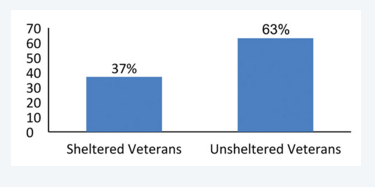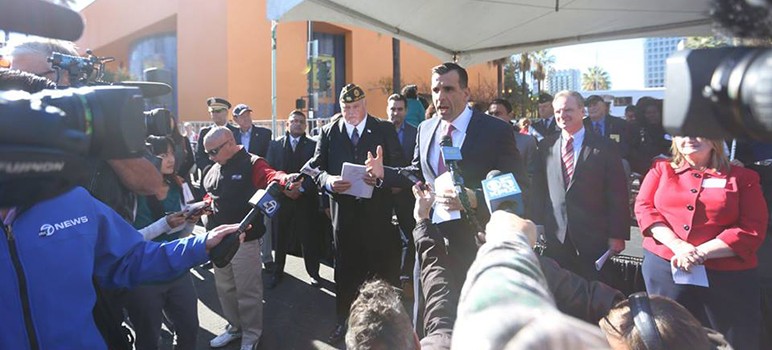Just before the Veterans Day parade marched through downtown San Jose, South Bay leaders unveiled a campaign to get hundreds of homeless veterans off the streets.
Called “All the Way Home,” the regional multi-agency initiative aims to end veteran homelessness in Santa Clara County by 2017, San Jose Mayor Sam Liccardo and county Supervisor Dave Cortese announced this morning.
“No man or woman who has served their country should sleep under a bridge at night,” Cortese said in a statement.
The city of San Jose has committed $6 million, the county $1.5 million a year and the Housing Authority another $7.5 million to the effort led by housing nonprofit Destination: Home.

Source: All the Way Home
Of the 6,500-plus homeless people who live in this county, 700 are military veterans. Nearly half of those veterans are chronically homeless, while 250 have subsidized housing vouchers in hand but no place to use them.
Cortese and Liccardo, who joined forces after squaring off in last year’s contentious mayor’s race, are asking corporations and faith-based groups to join the initiative. But they especially need landlords to step up.
Calling all landlords! Help us by renting to homeless veterans. #allthewayhome We have 300 men and women searching for housing today.
— Destination: Home (@DSTNHome) November 11, 2015
“We can—and we will—end veterans homelessness in our community,” Liccardo wrote in an op-ed for the Mercury News. “It will take all of us working together, but Wednesday’s launch of our ‘All the Way Home’ campaign shows that we have a strong and growing coalition committed to ensuring a dignified home for every veteran.”
On Tuesday, the City Council voted to fix up a falling-apart apartment on Vermont Street to house veterans. Last month, the city bought the first of several motels to convert into transitional housing. Policymakers are also considering a $250 million bond to address regional homelessness.

Source: All the Way Home
According to Destination: Home, most of the region’s homeless veterans are unsheltered, while 71 percent lived in this county when they became homeless.
Many veterans suffer from traumatic brain injuries, mental illness and physical disabilities, which puts them at a higher risk of becoming homeless—even more so in Silicon Valley’s expensive, competitive rental market.
The regional campaign stemmed from First Lady Michelle Obama’s national initiative with the U.S. Veterans Administration Housing and Urban Development and to end veterans’ homelessness. For more information, visit the All the Way Home Facebook page and campaign website.
Great commitment from @DaveCortese @sliccardo we will bring our vets #AllTheWayHome @DSTNHome @211SCC @MayaEsparza3 pic.twitter.com/uTNc0tU5dq
— Jennifer Loving (@jenloving23) November 11, 2015


Jenn’s bar chart shows the percentages of homeless vets with physical and mental health problems. Every one of the five categories listed would effectively preclude productive full time employment for those Vets, thus pretty much guaranteeing they will become homeless. Why isn’t the VA stepping up on a national level to provide shelter for these Vets? Oh yeah, they can’t even get the health care part right. This is a national disgrace.
Here’s an idea that might save some money. Assemble dossiers on every one of those 250 vets to determine: hometown; location where veteran most recently paid rent or mortgage; employment history, last decade; family information; criminal record; child support history, if any; psychological disability, if any; substance abuse and treatment history, if any; discharge type and reenlistment code (on DD214); monthly benefit level (received or qualified to receive). Assign values (plus or minus points) on these factors and assemble an eligibility list. Make the dossiers available online and encourage the public to review them, contribute (GoFundMe) to those of their choosing, and lodge their objections to the inclusion of others (basic training washouts, dangerous criminals, drifters here for the benevolence, etc).
If an emotionally-charged term like “veteran” is going to be used to rally support, the public deserves the information necessary to avoid once again shooting itself in the foot in a frenzy of compassion. What we don’t need is for city morons to put out yet another welcome mat for predators and outsiders in need.
Good points. This is a national problem. One city should not take it on alone. And how do we sort the veterans? Who are the lucky few?
I enlisted in another state in 1967, but was discharged in California in ’71. I stayed here, but CalVet benefits were only for those who enlisted here. Lots of guys I served with bragged about enlisting in this state and a few others like Texas, specifically because of the generous benefits.
I’m not complaining, but I can see immense problems with any such campaigns. Buying an apartment house will not do much except give job security to some local bureaucrats. Veterans will fight over the few available apartments, and as with almost everything else, Gresham’s Law will ensure that the least appropriate ones get them. If they limited the spaces to only those who were awarded a Silver or Bronze star for valor, there still wouldn’t be nearly enough housing. And you know they won’t do that anyway.
Better to lobby the feds for more taxpayer loot. This is just a feel-good project that will never come close to fixing veterans’ problems. The cost will be far above any benefits to taxpayers. And as with all such bureaucratic programs, once implemented, this will never go away — and the future demand for more money will be as predictable and unending as the tide.
I would have to put the :Discharge type listed on the DD-214 at the top of the list. I am sick and tired of the s#!tbirds who walk around in drug and alcohol induced stupors claiming PTSD from the :”things they have seen…” When you start digging into their personal story you learn they washed out of boot camp because they were then who they are today non-functioning grifters… or psycho/sociopaths convicted under the UCMJ of all sorts of deviance I’m all for supporting Veterans but not every sack of s#!t that passed through a MEPPS qualifies as a Veteran serving the USA.
What is it about so many current members of the armed forces that seems to have made them far more susceptible to emotional problems than existed in the past? If they can ever get around to it, the VA needs to study the demographic of post Korean War Vets to ascertain why so many more Vets suffer from PTSD and emotional problems than did Korean War or WWII Vets. What’s so different among current Vets that has resulted in such a higher number of PTSD and other emotional problems among current Vets than existed in the past? The carnage witnessed by WWII Vets as a group exceeds that witnessed by Desert Storm and Afghanistan Vets by several orders of magnitude, yet there was not such a high percentage of PTSD and emotional problems in WWII Vets as there is in the current small war Vets. This needs to be studied in depth. Is it as simple as, that in the effort to meet quotas, recruitment officers aren’t too particular? Have the Vets’ experiences caused their problems, or did they enter the armed forces with those problems? Has the government simply swept this issue under the rug as it did for a couple of decades with the effects of Agent Orange exposure?
WW2 Vets are one tough generation. They survived the Depression – sure they were very young but they survived due in no small part to the families and society as a whole they were raised by. They saw carnage – no doubt – those who came home for the most part integrated back into society and were successful in life. Im sure a small minority suffered from PTSD – another small minority – probably no more than the normal percentage of society that leans criminal returned to who/what they were anyway.
Looking at the carnage being waged in Paris right now I wonder how we will survive what is coming to our soil with so many in America being more concerned with their ability to obtain marijuana, whose feelings might be hurt by Halloween costume and so many other of the current counter -culture issues ruling the day …
This generation has the highest recruiting standards in our history as an all volunteer force with significant barriers to entry. Only 25% of the young adult population would even be eligible to join and far fewer actually do. We have deployed the same cohort of troops time and time again over the last 15 years, and it’s not uncommon to find someone who deployed 3 times in a 4-5 year span. To say that the vets of this generation are somehow softer than those that came before is inaccurate to say the least, but the circumstances around the deployment of our troops must surely have an effect.
Previous generations dealt with symptoms of PTSD before the disorder was fully understood. Both of my grandfathers saw extensive combat in World War II and had productive lives despite nightmares, flashbacks and undiagnosed substance abuse issues. The vast majority of current veterans who return go on to have productive lives with more access to resources and help, despite the trauma they may have faced. Let’s not generalize.
-From a GWOT Veteran
I agree with Cortese that no man or woman who has served this country should sleep under a bridge. However, I fail to see the long-term solution to a very complex problem. Before you ask housing providers to “step up”, what happens after the housing is secured? Are we asking employers to also step up? How are we addressing the mental health issues charted in this column? Are we setting a path to independent living? I would assume (hope) there is an in-depth, life-changing plan for these veterans.
The VA Hospital in Palo Alto gives hiring preference to Veterans. IIRC DOC and Sheriff already have programs in place that give hiring preference for honorably discharged vets. Maybe since they’re already doing in in DOC/Sheriff they can simple expand it to all other departments in both the county and city.
The VA Hospital in Palo Alto gives hiring preference to Veterans. IIRC DOC and Sheriff already have programs in place that give hiring preference for honorably discharged vets. & etc.
After I was (honorably) discharged I applied for a job at the US Postal Service (the ‘Post Office’ back then). Got high marks in the test (top 1%), and was given ‘priority’ because of my veteran status.
But I was never offered a job, even though I pestered themn about it for a couple of years. (When I look at USPS employees, I suspect I didn’t look like the kind of employee they wanted.)
So even though veterans are given ‘priority’, I wonder what that really means. Does it supersede priority by race? By sex? (‘scuse me; by ‘gender’). Or these days, immigration status? (Is the immigration status of postal emplioyees checked? Answer: no, it’s not permissible to even ask them if they’re here legally.)
I guess i’m cynical. But like Lily Tomlin said, it’s hard to keep up. Everything about modern government and society competes for my cynicism, so I don’t know where it stops…